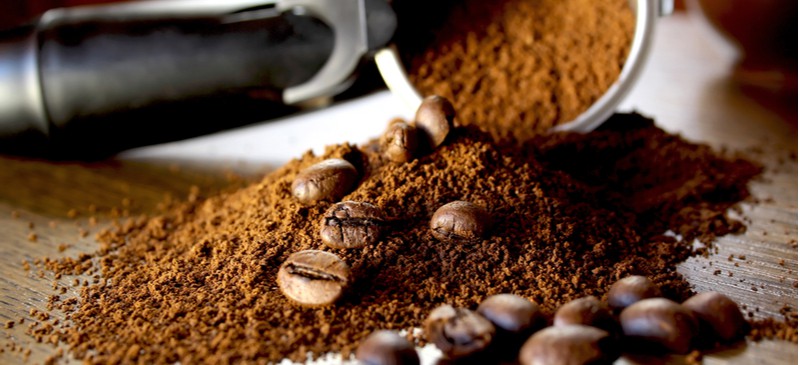
If you make coffee at home every morning, you may be used to chucking the coffee grounds in the garbage afterwards. Yes, they keep the scent of coffee lingering in your kitchen for hours or days, but research published in the Journal of Agricultural and Food Chemistry points out that used coffee grounds are a massively produced residue that are causing environmental problems.
For that reason, reusing them has become a focus of interest. Did you know that coffee grounds can be used at home and in the garden? They have the perfect texture for exfoliating skin and surfaces, they naturally deodorize the air and they contain compounds that actually fertilize the earth.
Who knew that used coffee grounds could be so versatile?
Top 10 Uses for Coffee Grounds
1. Make a Cleansing Coffee Scrub
A coffee body scrub is an excellent way to exfoliate the skin, reducing the buildup of bacteria, dirt, and dead skin cells. Using it daily or throughout the week will reduce old skin cells and allow new cells to emerge.
Plus, massaging a scrub made with grounds into your face and under your eyes will help to boost circulation and improve skin quality. You may notice that it improves skin tone and reduces dark circles under your eyes.
Use this DIY face scrub with coffee to deeply cleanse and refreshen your skin. Not only does it work as a natural exfoliator, but it’s also rich in antioxidants that will promote healthy aging.
2. Reduce Cellulite
There’s a lot of curiosity about coffee grounds for cellulite and how it works. The caffeine in the grounds promotes the dilation of blood vessels and works to tighten the skin, helping to reduce the appearance of cellulite.
On top of that, this DIY coffee scrub for cellulite exfoliates the skin and when it’s massaged into areas of concern, this action decreases tissue edema and stimulates the activity cells that produce collagen. Research suggests that this may reduce the activity of fat cells and reduce cellulite.
3. Make a Natural Hair Dye
Did you know that coffee can be used as a natural hair dye? It doesn’t have the same effects as permanent hair dye, but it can work as a toner that makes your hair a bit darker.
To dye your hair, mix brewed dark-roast coffee and coffee grounds with any leave-in conditioner. Then apply it to clean, damp hair and let it sit for at least an hour. Then wash it out.
You can also try this DIY coffee and cocoa eyebrow dye, which will allow you to tint your eyebrows safely at home.
4. Treat Your Hair and Scalp
Just like coffee grounds uses for skin works as a natural exfoliator, it can be used on your hair and scalp, too. Massaging the grounds into your scalp will remove dead skin cells and buildup, which stimulates hair follicles.
Research indicates that when caffeine is applied to hair follicles, it may even promote hair growth. On top of that, it can leave your hair looking extra shiny too.
To use coffee grounds on your hair, simply fill your palm with the grounds, massage them into your hair and scalp for 1–2 minutes, then rinse and shampoo as usual.
5. Make a Natural Deodorizer
Looking for easy uses for used coffee grounds, just put them in a cup and let it sit in your refrigerator. They work as a natural deodorizer, just like baking soda. The grounds absorb any unwanted odors in the air, so they can also be used in bathrooms, kitchens and more.
6. Clean Grease and Grime
The abrasive texture of coffee grounds helps to remove grease, grime and buildup. Instead of using harsh chemicals or sponges to clean pots, pans and hard-to-clean surfaces, used grounds can do the trick.
On top of that, studies show that roasted coffee possesses antibacterial activity, which is enhanced by the caffeine content.
7. Make Compost
To use coffee grounds in the garden, add them to your compost. The grounds are nitrogen-rich and serve as the perfect addition to your DIY compost.
Nitrogen is one of the four key factors for a thriving compost, along with carbon, oxygen and moisture. Research highlights that this mixture works to enrich the soil, helps it to retain moisture and encourages the production of beneficial bacteria.
Coffee grounds in compost is considered a green material, so if you add it daily or weekly, make sure you’re also adding brown materials to keep the balance of nitrogen and carbon. Some brown materials include dead leaves, branches and twigs.
8. Use As Plant Fertilizer
Coffee grounds as fertilizer are beneficial because of their nitrogen content. Plus, the grounds improve soil drainage, water retention and aeration. They also attract important earthworms and promote the presence of beneficial bacteria in the soil.
To be sure that the grounds don’t lower the pH of the soil and make it too acidic, it helps to rinse them in water first. Then simply mix the grounds in plant soil or sprinkle them directly on top of the soil.
9. Repel Pests
Did you know that used coffee grounds repel insects? Studies conclude that the chemicals found in grounds are highly toxic to mosquitoes and some insects.
Adding them to a cup and leaving it next to outdoor seating will deter mosquitoes and other pests. And sprinkling coffee grounds in the vegetable garden will keep slugs, snails and even cats away. This is an effective use for unbrewed coffee grounds too.
10. Add Flavor to Baked Goods
Coffee grounds are an excellent addition to chocolatey baked goods because they bring out the flavor. They also work well in recipes that include caramel, butterscotch, vanilla and even mint.
You can add used grounds into batter or filling — the taste works really well in brownies and chocolate cake. Blending the grounds in a food processor will avoid larger pieces in your batter, but using finely ground coffee works too. You can also add ground coffee beans to frostings and fillings to add flavor and texture.
Can You Consume Used Coffee Grounds?
Used coffee grounds is sometimes added to baked goods recipes, meat rubs and sauces, but are they really safe to consume?
A lab study conducted in Spain suggests that used coffee grounds has a prebiotic effect on gut microbiota by stimulating healthy bacteria. But we aren’t sure it they would impact the human gut similarly.
Another lab study, published in Food Chemistry, shows that used coffee grounds are rich in dietary fiber and when fermented in the gut, produce short-chain fatty acids that prevent inflammation.
Research published in the Journal of Agricultural and Food Chemistry found that used grounds had high amounts of hydrophilic antioxidant compounds. In fact, the antioxidant capacity of grounds were higher than what’s found in brewed coffee.
Despite these potential benefits of consuming coffee grounds, there’s evidence that it may also increase cholesterol levels. Studies analyzing the impact of consuming unfiltered coffee show that it can increase LDL cholesterol. This is due to the diterpenes in coffee, which may effect serum lipids. But the impact of consuming coffee or grounds on cholesterol depends on how the coffee is filtered and brewed, and the origin of the beans.
Overall, it’s likely safe to add grounds to baked goods and even use it to tenderize or flavor meats, but keep it minimal to avoid impacts on your cholesterol levels.
Final Thoughts
- If you’re home brewing coffee, you probably throw out plenty of coffee grounds. But guess what? these grounds can be used in several ways around your house and garden.
- Grounds work as excellent exfoliators, they fertilize the soil in your garden and they even repel mosquitoes and other pests.
- It’s likely safe to consume grounds in baked goods, once in a while. Overeating grounds may lead to increased cholesterol levels, so it’s not something you’d do regularly.
Source: Dr. Axe
Don’t Forget to Share and Follow us across our social channels to get the latest, on Facebook , Twitter .






